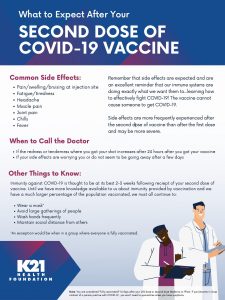As the COVID-19 vaccines become widely available across the country, more and more people have protection from the coronavirus. But we can’t get back to our pre-pandemic lifestyles just yet.
The COVID-19 vaccines are most effective when everyone is vaccinated. Your vaccine will protect you from severe illness, hospitalization, and will likely keep you from becoming infected with COVID-19 at all. But it is still slightly possible to have an asymptomatic infection that could create complications and illness in others.
As the year goes on, expect things to look more “normal;” but, “normalcy” won’t happen quickly, and there may be setbacks along the way.
Immediate Effects
 Vaccines are the best protection we have against the coronavirus, but receiving vaccination may come with side effects. The most common effects, however, are simply a sign that your body is building immunity to COVID-19. These include:
Vaccines are the best protection we have against the coronavirus, but receiving vaccination may come with side effects. The most common effects, however, are simply a sign that your body is building immunity to COVID-19. These include:
- Soreness/pain at injection site
- Fatigue
- Headache
- Muscle or joint pain
- Chills
- Fever
- Nausea
These symptoms are more frequently experienced after the second dose of the vaccine and are often more severe. Make sure to contact your doctor if the redness or tenderness at the injection site increases after 24 hours or if your side effects don’t dissipate after a few days.
Immune, Not Invincible
Vaccines provide immunity, not invincibility. We also don’t know how long immunity lasts. The COVID-19 vaccines that are currently available provide exceptional protection, but they’re not 100% effective. Current data shows the mRNA vaccines are about 94% to 95% effective. This means that people who’ve been fully vaccinated could still contract COVID-19, but the chances are slim. People who’ve been fully vaccinated won’t get as sick as they would have without vaccination, but it is possible to still spread the virus to people who haven’t been vaccinated.
Complete Protection Takes Time
While the vaccines provide a high level of protection from COVID-19, it takes time for them to reach their full level of immunity. Both the Pfizer and Moderna vaccines require two doses. The first dose of either offers moderate protection, but you won’t receive the vaccine’s full benefits until two weeks after your final shot. The Johnson & Johnson vaccine only requires one dose, but it also needs time to reach its full effectiveness, meaning you won’t be fully protected until two weeks following your shot.
Because the vaccines are so new, we don’t have enough data to determine how long their protection lasts. You may need a booster in the future, but we don’t yet know when or how often.
Will We Reach Herd Immunity?
If we want to see post-pandemic times sooner, we need two things: more vaccines and more vaccinated people. Herd (or community) immunity can happen when the majority are immune with either the antibodies or vaccination.
Viruses need people to spread. So, the more people who are vaccinated, the safer our population—which means we could, in time, reach herd immunity. While things are looking up, caution and responsible behavior should remain until we achieve lower rates of COVID-19 in our community.
Life After Vaccination
Currently, the CDC says people who are fully vaccinated can be unmasked and inside with others who are also fully vaccinated. It’s also safe, in certain instances, for fully vaccinated people to spend time inside, unmasked, with those who are unvaccinated—if those who are unvaccinated are from the same “bubble” and have no underlying health conditions.
If you live with people who can’t get vaccinated, you should still keep your unmasked interactions limited so you don’t develop what could be a mild case for you, but a serious case for them.
Please continue to follow all of the recommendations and guidance from our community’s health officials. For more information about COVID-19 vaccines and the current state of Kosciusko County, check out their website or consult with your medical professional.
We can’t wait until we can hug our loved ones again.


